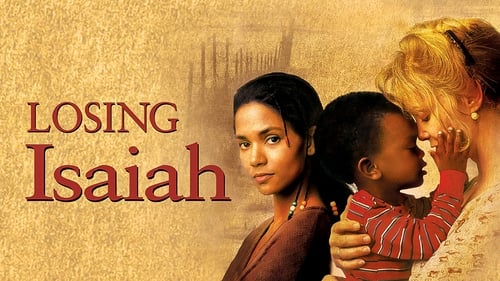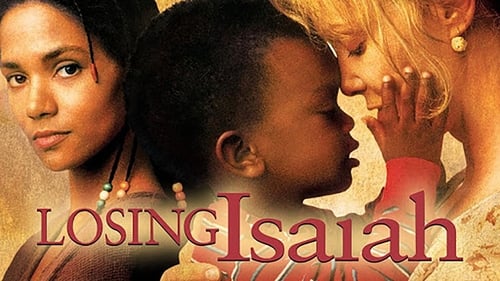Mjeteconer
Just perfect...
Platicsco
Good story, Not enough for a whole film
Console
best movie i've ever seen.
Zlatica
One of the worst ways to make a cult movie is to set out to make a cult movie.
tieman64
Directed by Stephen Gyllenhaal, "Losing Isaiah" stars Halle Berry as Khalia Richards, a drug addicted African American who abandons Isaiah, her newborn baby. This baby is adopted by a white social worker, played by Jessica Lange. Years later, Khalia attempts to regain custody of her child. A court case ensues.The situation presented in "Losing Isaiah" is a bit of an anomaly; birth mothers typically only have a 30 day window to reclaim children put up for adoption. In "Losing Isaiah", though, Khalia never consents to have her child adopted, creating a legal loophole.Nevertheless, "Raising Isaiah" does ask somewhat interesting questions: should children like Isaiah be returned to their birth mothers, or should they be left with middle-class white mothers? What is in the child's best interest? What are the racial implications of these matters? What is legal? What is moral? "Losing Isaiah" is too superficial to meaningfully wrestle with these questions, though it does eventually settle upon a solution that demonstrates a certain type of wisdom. Here both mothers, white and black, join forces in the interests of their child; neither has a monopoly on love. Samuel L. Jackson co-stars as a hilariously disgruntled lawyer.7/10 – Worth one viewing.
gcd70
Should an African-American child be raised by Anglo-American parents? This is the perplexing question raised in Stephen Gyllengaal's tragic "Losing Isaiah", the story of the desperate custody battle between the white adoptive parents and the black biological mother of little four year old Isaiah. Khaila Richards has discovered that the baby she left in a cardboard box is still alive and lays claim to him, stating that he should not be raised by parents of a differing colour. Margaret and Charles Lewin will not concede without a fight though, and they enlist an African-American attorney to represent their cause.Director Gyllenhaal fails (incredibly) to generate compassion for any of the characters involved, not even Isaiah! Naomi Foner's screenplay (from Seth Margolis' novel) has unfortunately underdeveloped its pivotal players, and thus we are unable to associate with them and get under their skin. The characters of Khaila and Charles Lewin are particularly overlooked.Here we have a film that presents a shocking and challenging topic without (somehow) shocking or challenging us. Failing almost entirely to invoke the emotions, I was no more inspired than having read the story in the newspaper. Marc John Jefferies is cute, yet Gyllenhaal barely even plays on this, amazingly.Both Director and screenwriter have skimmed over the top of all the sensitive issues and shirked all the antagonistic problems that "Losing Isaiah" raises. They never stir deeply enough nor give the movie a harsh enough edge. The soft ending is a major disappointment too, when this picture desperately needed a hard-hitting finale to drive home a point, one Mr. Gyllenhaal's film never had to make in the first place.Racial issues throughout are intriguing yet sadly never fully examined. Should black and white mix when it comes to raising children? Can white folks raise an African-American child satisfactorily, so that he has a full understanding of who he is, his heritage, and so that he's sure of his position in society and is able to form and maintain stable relationships? Then again, is an ex-crack addict who threw her new born baby out with the trash fit to be a mother? The ultimate question is of course, what's best for Isaiah? With all this in mind, the whole movie just did not have the impact it required and will leave you untouched.All the acting is of a good standard, though never to the height it could have been. Both David Strathairn and Samuel L. Jackson ("Pulp Fiction") are hard pressed to do anything with their limited roles, Halle Berry shows she's on the rise with a convincing portrayal of Khaila, while Jessica Lange is strong but she's been infinitely better. In fact the most disappointing thing about Ms. Lange's showing was her appearance! She looked dreadful, as if she hadn't slept in days, and her hair was awful. Certainly a far cry from the gorgeous blonde in "Tootsie".It was great to hear another fine Mark Isham score.Tuesday, June 6, 1995 - Hoyts Forest Hill Chase
waycar111
I'm living this nightmare. The courts for the most part don't care about the emotional well-being of children, they are hell-bent on returning the children to the biological mother, regardless of any history. I have a stepdaughter, who is now 23 years old. 5 years ago, she gives birth to a baby girl, mixed race but irrelevant in my story, leaves the baby at my house. Motherhood interferes with the more important things in life, which is partying, getting drunk, high, and getting laid on a daily basis. The child is left with my wife and I, "mom" only shows up when she needs something at one point 14 months go she doesn't call, or show up. When she finally does, it's to "borrow" money for an abortion, she shows up at my house and doesn't even acknowledge her daughter is even in the room.In the meantime, I hired a lawyer and got permanent custody. I won the case by default, "mom" failed to show up in court.5 years go by. My wife and I are raising this beautiful girl as our own. Meanwhile, "mom" has another baby, a boy. One day, children's protective service shows up at our house with an 8 month old boy in tow. After numerous complaints, mostly because she would leave him with unsuspecting people who agreed to babysit the boy for weeks at a time, and removed him from her custody. Naturally, the obvious place to bring the boy was our house. To bring this to an end, now we are in a custody battle. The court gives the evil stepdaughter a lawyer. Not only does she want the boy back, but the 5 year old girl as well.Court case has been dragging out for a year now, 5 year old girl, has no idea what's going on. She knows her mother only as some obnoxious woman that comes over once in a while. The judge,a middle age single woman with short hair and "comfortable" shoes, if you get my meaning, has given the stepdaughter every benefit of the doubt, and treats my wife and I like the villain in all of this at every turn. At this point, I'm convinced this is not going to end well, and not in the best interest of the children. I am especially concerned about the 5 year old, who has been with my wife and I since the day she was born and knows no other home but ours.So to those that said the plot is unrealistic, I can tell you from experience that it is not.
emisue02
Try watching this movie sometime with a white woman who is the adoptive mother of an African-American child. I happen to baby-sit such a family and watched the movie with the kids' mother. I don't know how she sat through it without throwing something at the screen-not that this is necessarily a criticism. This film is very thought-provoking, though I think for the wrong reasons. The main focus is all about color and whether people should raise children of different races. Jessica Lange's character had a small speech in the courtroom about how love makes a family more than race, but it was just glossed over and the focus of the film went right back to race defining families. Maybe I just see this differently because of my close association with a family where the parents and one child are white and the other child is not, but family is not about race-corny as this may sound, it really is about love and support. The ending, as some other reviewers have said, is very wishy-washy. My viewing companion and her husband, who joined us at the end, liked it because they want to have a good relationship with their daughter's birth mother. I agree with them on that, but if the movie is going to deal with legalities so much, it should resolve those legalities at the end of the movie.







